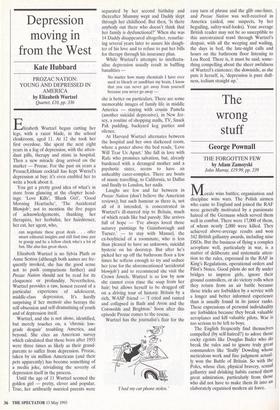Depression moving in from the West
Kate Hubbard
PROZAC NATION: YOUNG AND DEPRESSED IN AMERICA by Elizabeth Wurtzel Quartet, £10, pp. 336 Elizabeth Wurtzel began cutting her legs, with a razor blade, in the school cloakroom, aged 11. At 12 she took her first overdose. She spent the next eight years in a fog of depression, with the atten- dant pills, therapy and stints in hospital. Then a new miracle drug arrived on the market — Prozac. For the past six years a Prozac/Lithium cocktail has kept Wurzel's depression at bay; it's even enabled her to write a book about it.
You get a pretty good idea of what's in store from glancing at the chapter head- ings: 'Love Kills', 'Blank Girl', 'Good Morning Heartache', 'The Accidental Blowjob'; not to mention the five pages of acknowledgements, thanking her therapists, her herbalist, her hairdresser, her cat, her agent, who,
can negotiate these great deals . . . offer smart editorial insights and still find time just to gossip and be a fellow chick who's a lot of fun. She also has great shoes.
Elizabeth Wurtzel is no Sylvia Plath or Anne Sexton (although both names are fre- quently invoked, she has the good sense not to push comparisons further) and Prozac Nation should not be read for its eloquence or profundity. Nevertheless, Wurtzel provides a raw, honest record of a particular experience of adolescent, middle-class depression. It's hardly surprising if her memoir also betrays the self-obsession and self-dramatising of youth and of depression itself.
Wurtzel, and she is not alone, identified, but merely touches on, a 'chronic low- grade despair' troubling America, and beyond. She cites an American survey which calculated that those born after 1955 were three times as likely as their grand- parents to suffer from depression. Prozac, taken by six million Americans (and their pets apparently) has become something of a media joke, trivialising the severity of depression itself in the process.
Until the age of 11 Wurtzel seemed the golden girl — pretty, clever and popular. True, her artibrarily married parents were separated by her second birthday and thereafter Mummy wept and Daddy slept through her childhood. But then, 'Is there anybody out there who doesn't think that her family is dysfunctional?' When she was 14 Daddy disappeared altogether, resurfac- ing several years later to assure his daugh- ter of his love and to refuse to put her bills for therapy through his insurance plan.
While Wurtzel's attempts to intellectu- alise depression usually result in baffling banalities — No matter how many chemicals I have ever used to bleach or sandblast my brain, I know that you can never get away from yourself because you never go away - she is better on particulars. There are some memorable images of family life in middle America — staying with cousin Pamela (another suicidal depressive), in New Jer- sey, a routine of shopping malls, TV, Snack Pak pudding, backyard keg parties and silence.
At Harvard Wurtzel alternates between the hospital and her own darkened room, where a poster above the bed reads, 'Love Will Tear Us Apart.' She fall in love with Rafe who promises salvation, but, already burdened with a deranged mother and a psychotic sister, seems to have an unhealthy carer-complex. There are bouts of manic travelling, to California, to Dallas and finally to London, her nadir.
Laughs are few and far between in Prozac Nation (don't believe the American reviews); but such humour as there is, not all of it intended, is concentrated in Wurtzel's ill-starred trip to Britain, much of which reads like bad parody. She arrives full of hope — 'I've always loved those naturey paintings by Gainsborough and Turner,' — to stay with Manuel, the ex-boyfriend of a roommate, who is less than pleased to have an unknown, suicidal hysteric on his doorstep. But after he's picked her up off the bathroom floor a few times he softens enough to try and seduce her (cue for the aforementioned 'accidental blowjob') and to recommend she visit the Crown Jewels. Wurtzel is so low by now she cannot even rinse the soap from her hair; but allows herself to be dragged off on a driving tour of historic Britain by a rich, WASP friend — 'I cried and ranted and collapsed in Bath and Avon and the Cotswolds and Brighton.' Soon after this episode Prozac comes to the rescue.
Wurtzel has the journalist's flair for the 'I had my car phone stolen.' easy turn of phrase and the glib one-liner, and Prozac Nation was well-received in America (aided, one suspects, by her beguiling, sultry-waif-looks). Your average British reader may not be so susceptible to this unrestrained trawl through Wurtzel's despair, with all the weeping and wailing, the days in bed, the late-night calls and hours on the bathroom floor listening to Lou Reed. There is, it must be said, some- thing compelling about the sheer awfulness of Wurtzel's existence; the downside, as she puts it herself, is, 'depression is pure dull- ness, tedium straight up.'


































































 Previous page
Previous page